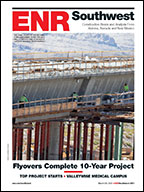If Congress ever progresses beyond its current partisan dysfunction, perhaps we will look back on June 18 as a turning point. That was the day Sens. Chris Murphy (D-Conn.) and Bob Corker (R-Tenn.) proposed raising the federal gasoline tax 12¢ a gallon over two years as a way to end the impending deficit of the Highway Trust Fund, the key source of highway and mass transit construction funds shared with the states. The tax has
not been raised since 1993, when Congress upped it from 14¢ to 18.4¢; fuel-efficient cars have cut the revenue. A higher gas tax remains the most even-handed, practical way of stabilizing the fund. The Murphy-Corker plan, which would placate opponents by including various tax cuts, could add $18 billion a year. The American Road & Transportation Builders Association has called it "one potential path forward." Given the political sensitivities about taxes, the Murphy-Corker proposal won't become law any time soon. Unfortunately, that leaves limited options for temporary solutions to the highway fund's pending deficit. Something must be done by next month before Congress leaves for the summer.
One idea is already on the table. The Obama administration, House Ways and Means Committee Chairman Dave Camp (R-Mich.) and Sen. Rand Paul (R-Ky.) have suggested tax-code changes to encourage U.S. firms to repatriate overseas earnings.
The Tax Complications
That proposal and any other that involves closing tax loopholes entangles the highway fund in the politics of a broad tax reform. Sen. Ron Wyden (D-Ore.), head of the finance committee, and some Republicans say they oppose such piecemeal changes to the tax code to bail out the trust fund. A front-to-back tax-code overhaul is needed instead, they say. As an alternative, Wyden has proposed an infusion from the General Fund to keep the highway fund stable until year-end (see p. 6). But after the infusion, what?
Unless Republicans in the House intend to severely curtail federal transportation spending—and so far no one is proposing that—the time for temporary fixes and posturing is over. A failure to take action on the Murphy-Corker plan, or something similar, will be another sure sign that partisanship has worked against the national interest.
To be sure, the federal tax code badly needs reform that, among other things, would lower the top corporate tax rate, currently 35%, and scale back loopholes. Highway Trust Fund stopgaps aren't the way to start that conversation. Despite the uncertainty over gas prices created by war in Iraq, the federal gas tax will have to go up. For perspective, remember that one of the biggest percentage increases in the gas tax came in 1983 and was signed by one of the great champions of small government and lower taxes: Ronald Reagan.


Post a comment to this article
Report Abusive Comment